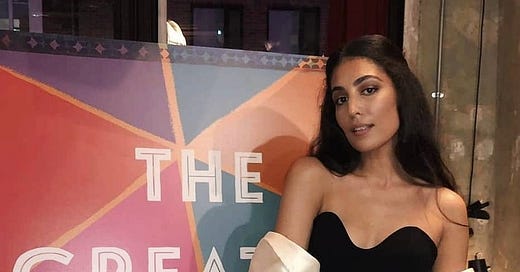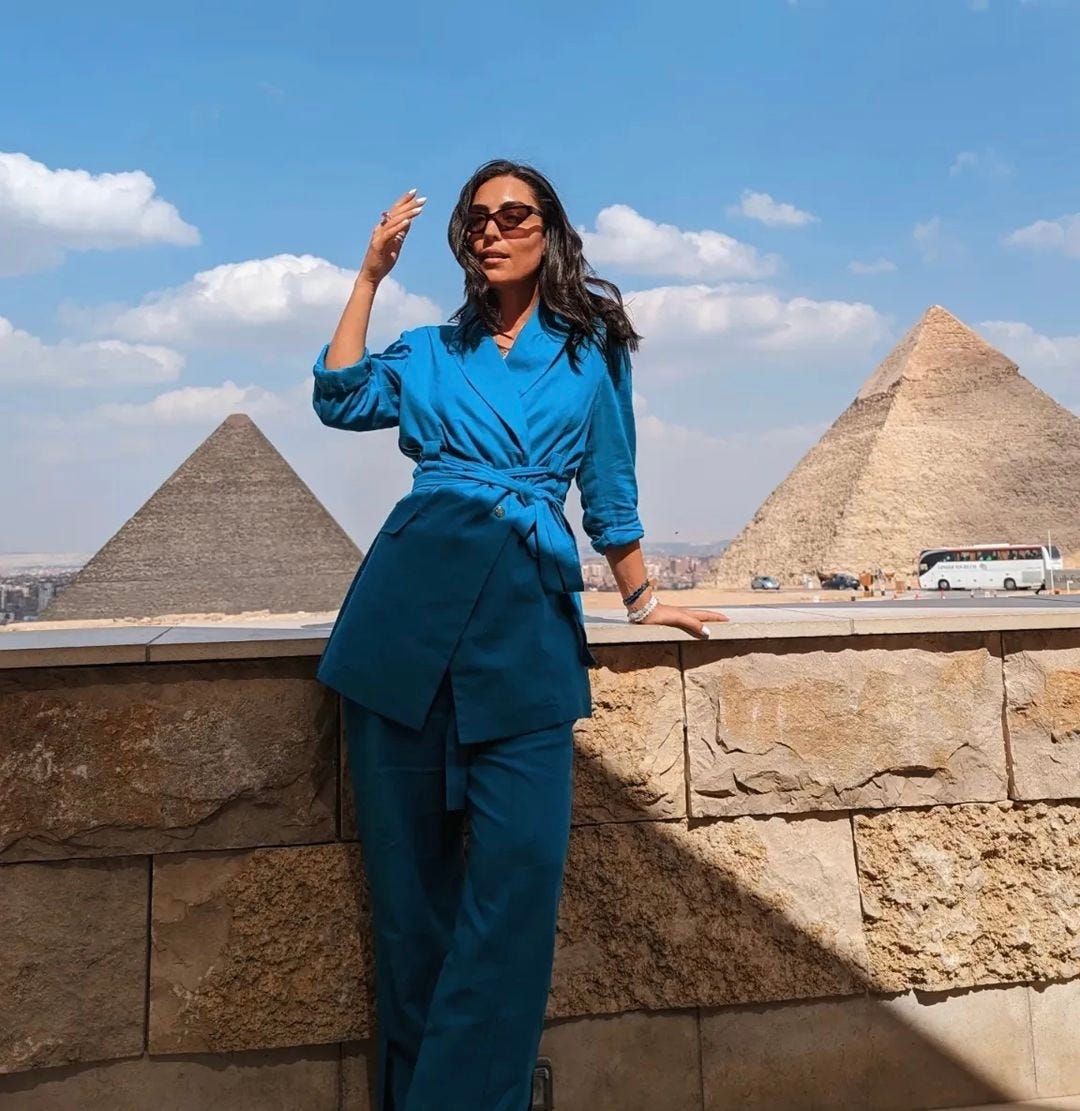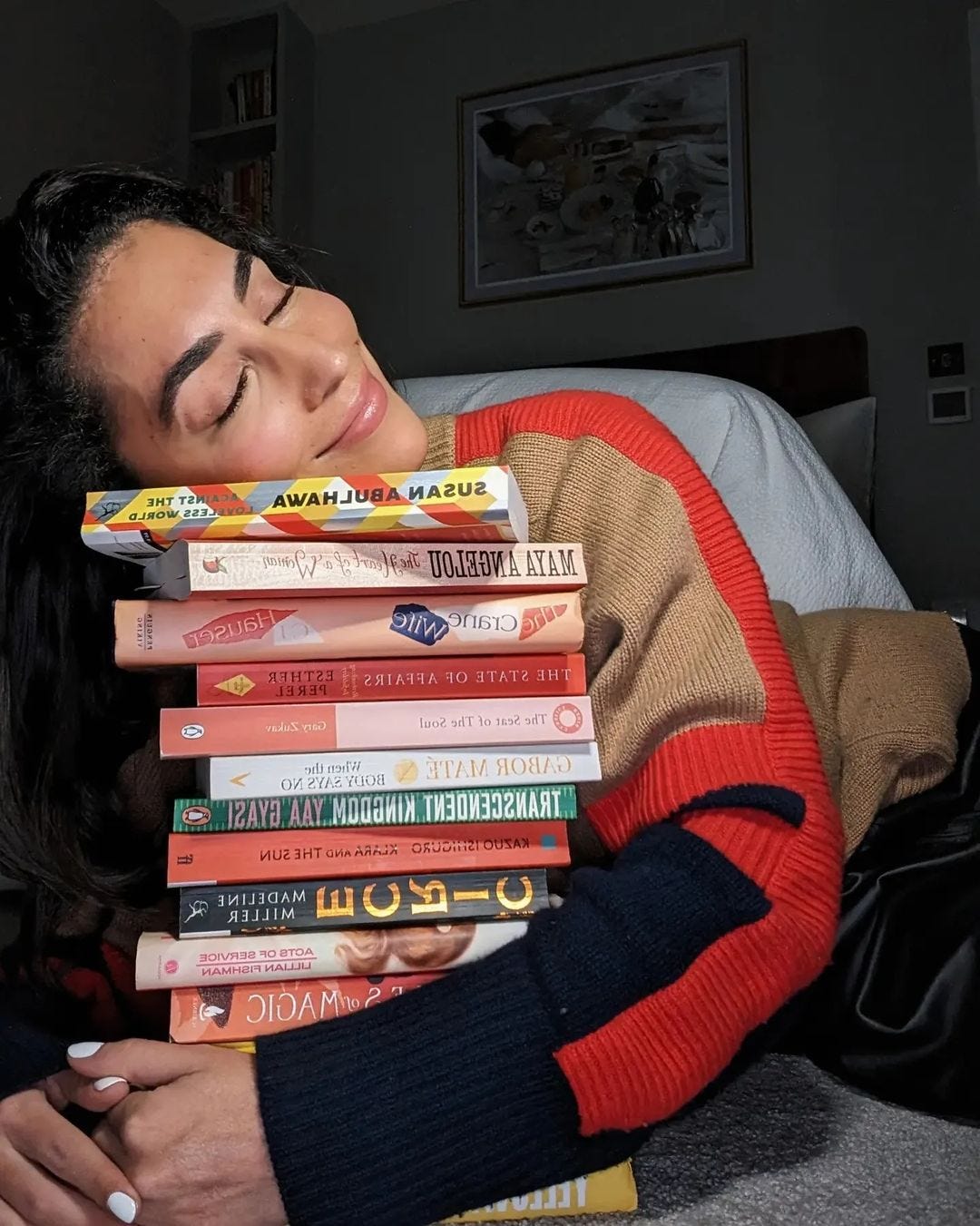Broadcasting: Alya Mooro
Egyptian-born, London-raised writer & author Alya Mooro shares her experiences and outlook on the industry, as well as the books, TV shows and individuals that have shaped her sense of identity.
I first met Alya in 2022, after reading (and fangirling over) her debut best-selling book The Greater Freedom: Life as a Middle Eastern Woman Outside the Stereotypes. Although Alya’s story is different to mine in many ways, there is so much I resonate with in her writing; she eloquently articulates what it feels like to exist in a liminal space, a space that is trapped between restrictive and reductive expectations of womanhood.
Her book was recommended to me by a British South Korean friend of mine who - despite being from a different background - really related to Alya’s experience of existing between cultures. This is a testament to Alya’s work; her words transcend boundaries, reaching and resonating with so many people globally.
Her craft is constantly evolving and reacting to the world we live in. At the moment, she is working on a very exciting TV project. It’s a pleasure to sit down with her and discuss her screenwriting, amongst other topics that I hope you find as stimulating and insightful to read as I did to discuss with her.
In the introduction to your book, you describe yourself as a hybrid, caught between British and Egyptian culture in a way that can make you feel like you don’t belong to either, like you’re an outsider. What is your relationship with that feeling today?
Growing up, I definitely felt like an outsider. There’s a story I often tell which sounds silly but it sums up how isolating it can feel. I was nine, at school in London, and there was this boy I fancied who fancied me too. I remember these two girls coming up to me and they were like, ‘I don’t understand why he fancies you. You’re brown, he’s supposed to fancy us’. People would tell me I was too hairy or ask me why I had an accent. There were so many micro-aggressions like that which made me feel like I didn’t belong.
Now, I think having access to both cultures is a strength. The older I get, I also feel like maybe everyone is an outsider in one way or another, particularly artists. Feeling like an outsider is the motivation behind why we create: we want to explain - even to ourselves - why we feel what we feel, why we are the way that we are. I’m re-reading Sister Outsider by Audre Lorde at the moment, and she writes about needing a certain poem to exist in the world and not finding it, so writing it herself. Personally, that’s why I do the work I do. We need to contribute to the puzzle, even if it’s with one tiny puzzle piece. It’s easier to be yourself if you can see yourself.
Do you feel like you can see yourself on screen or in literature?
I feel really sad to say this, but for a long time I didn’t. Or I did, but it was never Arab women. I’ve always been drawn to black culture; there is a long history of incredible black feminists whose writing formed a real foundation for me growing up because it felt like the closest to my experience. It wasn’t until I started to write my book that I began actively seeking out Arab feminists. Something that was really grounding for me was reading Nawal El Saadawi’s autobiography. I hadn’t heard of her before, and then I came across my grandfather’s name in her book! It turns out they were both medical students together in Egypt. I was lucky enough to meet her shortly before she passed away. She was giving a talk at City University and I went up to her and introduced myself. That was a beautiful moment. It reminded me that we are all standing on each other’s shoulders, and that we all face individual oppressions. The oppression black women face is not the same as the oppression I face as an Arab woman. As much as we can borrow and feel empowered by other experiences, we do need our specific stories addressed.
Are you seeing more specificity in terms of representation for people from the SWANA (South West Asian and North African) region and its diaspora?
I think we have a long way to go! The 2023 UCLA Hollywood Diversity Report found that, of the top theatrical films, actors and writers from the MENA region made up only 1.1%. So we really need to change that. But I also have a lot of hope, especially when I look at the younger generation who are understanding and articulating their identities in ways I only began to when I was 27. I’d been working in journalism for six years, totally ignoring the fact that I was Arab or Muslim or that I had this third culture identity. I didn’t think it was relevant or important because I didn’t see anyone else talking about these things. The more we tell our stories, the more the younger generation will have something to tell them that their stories do matter.
You are currently working on a TV project. What inspired you to start exploring screenwriting?
In my book I write about the importance of seeing yourself, and in doing so I started to explore the extent of what that really means. Since the book came out, I’ve been figuring out which stories suit which mediums and following my curiosity with that. I also struggled with going back to journalism after having so much space for nuance in the book. I call myself a recovering journalist for many reasons, one of them being that I don’t believe in objectivity, which, as a journalist, you’re told you’re supposed to be. I don’t think objectivity exists. I feel like journalism ends up pandering to the oppressor at the expense of the oppressed, which is starkly apparent at the moment in terms of the coverage in Palestine.
I still do journalism sometimes, largely as a way to support creators from the SWANA region who are doing interesting things, but I am really enjoying writing for screen at the moment. There’s something one of my filmmaker friends told me when I started, and that’s ‘show, don’t tell’. It’s been a really special challenge for me to explore how to do that in ways that are entertaining.
What are some of your favourite TV shows?
Insecure! That’s my favourite. I’ve just binged the second season of AlRawabi School for Girls. It’s one of the top ten shows watched globally at the moment which has made me so so happy! To have a show in Arabic exploring the nuances of being a young Arab woman in such a truthful way, and to see it resonate so much with a global audience is incredibly important. I enjoy stories that provide nuance. I don’t like to watch things that I don’t feel I am learning or expanding from. I like shows that change or broaden the way I see the world.
It’s interesting that neither of those shows are British. Do you think there’s a difference in the way the US and the UK talk about identity?
Ooh, I think so. Maybe in the US they are ahead of the conversation because they had to be. Whereas we are only just starting to have it now. We have so much catching up to do, and I think we’re much more defensive here. I also find it interesting how, in the US, people are much more likely to say they are American. In the UK, a lot of us who are part of the diaspora will identify as being so. I was having a conversation with my friend recently and he asked me ‘are you British or Egyptian?’ and I said ‘maybe I’m from London!’. I feel like that’s a thing in itself to be from London. It’s its own culture.
We’ve spoken about Nawal El Saadawi and Audre Lorde. Who are your other inspirations?
Issa Rae! I love the way she has broken the stereotypes about what a black woman is ‘supposed to be’ in such a funny relatable way. I love Doria Shafik and all of the OG Egyptian feminists. I read a lot, at least one book a week, so I keep discovering new people who inspire me and I feel extremely grateful for that. I think Alain De Botton’s Essays in Love is such a beautiful and unique piece of writing. I’m loving Susan Abulhawa’s writing at the moment, and A Woman Is No Man by Etaf Rum. I recently read an amazing proof copy by a first time author called Daughters Of The Nile. I can see and feel a real resurgence in Arab storytelling. I hope it continues…we aren’t going anywhere!
When you exist between cultures, sometimes you can feel like there are different versions of you. When do you feel the most yourself?
Either when I’m reading alone in my bed, or when I’m in flow and creating something. I’ve loved being in the writers’ room for my show and riffing off the other creatives. I think it’s actually connecting with others that makes me feel the most like myself. I can feel that connection if I’m having a beautiful conversation with someone and we’re really understanding each other. Or if I’m connecting with someone who is no longer with us through their words or their music. I went to this incredible DJ Nooriyah’s night recently and I had the most amazing time surrounded by people who were all feeling the music with me. I think that’s when I feel the most myself. When I’m grounded and connected. And like I belong, even if it’s just for those few minutes.







Love this so much Mal. Can’t wait to read more
I loved chatting with you for this! Thanks for your brilliant and thoughtful questions xx